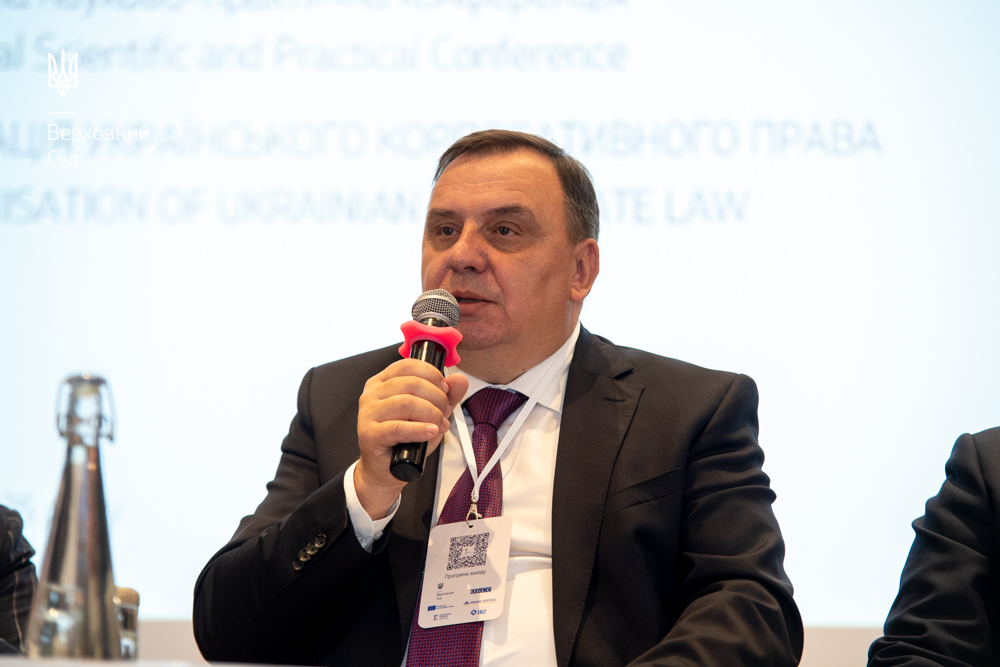EU Project Pravo-Justice Supported the International Scientific and Practical Conference "Europeanisation of Ukrainian Corporate Law"

On May 30, the International Scientific and Practical Conference “Europeanisation of Ukrainian Corporate Law” was held, organised by the Supreme Court with the support of EU Project Pravo-Justice, OSCE projects in Ukraine, and the German Foundation for International Legal Cooperation. The event was held on the occasion of the 34th anniversary of the establishment of the economic (arbitration) courts in Ukraine. The conference was attended by judges of the Supreme Court and economic courts, representatives of the Ministry of Justice of Ukraine, the Office of the President of Ukraine, MPs, attorneys, lawyers, academia, and international experts, including those of EU Project Pravo-Justice.

“This conference is an example of constructive cooperation aimed at improving corporate governance in accordance with modern challenges. The key aspects of the discussion are greater transparency, protecting the rights of shareholders and creditors, as well as introducing effective management tools. We aim at shaping a common vision on resolving problematic issues and coordinating the efforts of all bodies and institutions involved in the European integration process, in the first place, so that the national legal system could successfully get through its European integration path,” said Stanislav Kravchenko, President of the Supreme Court.
Iryna Mudra, Deputy Head of the Office of the President, emphasised that corporate reform was primarily about values: integrity, transparency, and balance of interests. According to her, when harmonising national legislation with EU law, it is important to bring it closer in terms of content rather than formally, while taking into account Ukrainian context and needs.
“Such efforts will give a signal to the international community: Ukraine is a state with clear and transparent rules, which is worth investing in,” emphasised Iryna Mudra.
Mykola Kucheriavenko, First Deputy Minister of Justice of Ukraine, highlighted the importance of trust in the economy through corporate law, which was becoming one of the key drivers in the context of European integration.
“Corporate law is not an abstract legal category, but a living mechanism that ensures trust in the economy, protects the interests of founders, investors, creditors, and citizens. That is why we are building a system based on transparency, digitisation and European standards,” he said.

Olha Sribniak, Deputy Team Leader of EU Project Pravo-Justice, noted that corporate law reform was not only an important component of harmonising Ukrainian legislation with EU law, but also one of the key areas which brought under one roof strengthening the rule of law and economic development.
“EU Project Pravo-Justice will remain focused on this interconnection. Therefore, our priority areas of intervention include facilitating the enforcement of court decisions, improving insolvency and bankruptcy procedures, and protecting property rights. These legal instruments are very impactful from the economic standpoint – both for citizens and businesses, and for the State,” said Olha Sribniak.
She also indicated that the effective, independent, and sustainable functioning of the judiciary was a determining factor in creating favourable conditions for investment, entrepreneurship development, and economic growth in Ukraine.

Asier Santillan Luzuriaga, Head of Section on European Integration, Good Governance and Rule of Law, and Civil Society at the EU Delegation to Ukraine, emphasised the systemic importance of corporate governance reform for Ukraine’s economic development and European integration. According to him, the reform should include increasing the responsibility enhanced management liability, creating independent supervisory boards, and introducing transparent reporting standards. Particular attention should be paid to the management of state-owned enterprises, which is one of the biggest challenges in this area. This includes, in particular, the introduction of effective restructuring procedures in accordance with the Ukraine Facility Plan, strengthening oversight, and improving the effectiveness of management decisions.
“Changes to corporate law play a key role in improving the business climate, protecting investors, and ensuring transparency of ownership. This brings national legislation closer to European Union law, in particular to the provisions of the relevant Directives, and deepens Ukraine’s integration into the EU single economic space,” stated Mr. Santillan Luzuriaga.
He also noted that it was important to ensure the unity of judicial practice, based on both Ukraine’s domestic needs and the case law of the Court of Justice of the European Union.
“The Supreme Court should play a leading role in the formation of stable, predictable judicial practice in corporate cases, which in turn will contribute to the stability of law application and increase investor confidence,” he said.
The conference “Europeanisation of Ukrainian Corporate Law” consisted of three thematic panels. The first one was dedicated to changes in the regulation of legal entities in the context of European integration. The second on brought up the issue of implementing European corporate governance standards. During the third panel, the participants focused on the protection of the rights of investors and creditors in connection with the change in the legal status of legal entities. Maja Praljak, Deputy President of the Commercial Court of Zagreb (Croatia), International Expert of EU Project Pravo-Justice, was among the speakers of the final panel. She presented, among others, the Croatian experience.
“Protection of creditors is one of the key factors of legal certainty and stability of market relations. Key European practices in this area have already been enshrined in Croatian legislation. Our model combines preventive guarantees with correcting tools, which ensures a fair balance between the freedom of establishment and the protection of creditors’ rights,” said Maja Praljak.